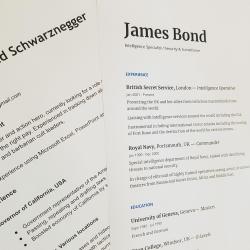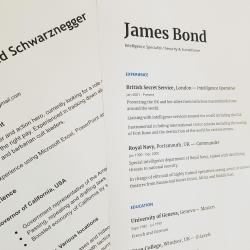Should You Include References on Your Resume? The Answer Might Surprise You
When it comes to crafting the perfect resume, job seekers often ponder which elements deserve precious space and which ones do not. One common question is whether to include references directly on the resume. The answer might surprise some: in most cases, references should not be included on your resume. Here's why:
1. Protect Privacy and Maintain Control
Including names, phone numbers, and email addresses of professional contacts on your resume can lead to privacy concerns. This document will be shared widely during your job search, and exposing personal contact information could result in unwanted solicitations or breaches of privacy. By keeping references off your resume, you maintain control over when and to whom you provide this information, ensuring that it is only shared with legitimate employers under serious consideration.
2. Save Valuable Space for More Important Content
Your resume is prime real estate. With only one or two pages to showcase your qualifications, every word counts. Including references—and often the outdated “References available upon request” line—distracts from more critical information about your skills, achievements, and experience. Instead, use this space to highlight why you're the ideal candidate for the job.
3. Simplicity and Directness
Modern recruiters are focused on efficiency, seeking candidates who present themselves clearly and concisely. Including references on a resume can unnecessarily complicate this document. Direct and straightforward resumes are more attractive to hiring managers, who often receive hundreds of applications for a single position.
4. Follow Established Professional Norms
The standard professional resume no longer includes references, as savvy job seekers know they will be asked for them later in the hiring process. Adhering to this norm shows that you are well-versed in current job application trends and understand what potential employers expect.
5. Timing is Everything
Employers typically request references at a specific stage of the hiring process, such as after an interview or when you're a finalist for the job. Providing this information before it is needed can be premature and result in reference fatigue, where your contacts might be over-queried. By waiting to provide references, you ensure they are contacted only when necessary, making their endorsements more impactful.
6. Customize as Needed
Once you've advanced to later stages in a job application process, you can offer a tailor-made reference list that aligns specifically with the skills and experience relevant to the position, reinforcing your qualifications even further. This customization adds another layer of strategic alignment to your application, playing a significant role in your favor.
When Should You Include References?
There can be exceptions to this general rule. Certain niche industries or international applications might require references upfront. In these cases, it's crucial to follow the specific application guidelines provided by the employer. Candidate-friendly platforms, like LinkedIn, where recommendations and endorsements are visible and controlled by the user, can also serve as a supplement to traditional references.
In conclusion, the conventional wisdom in today's competitive job market suggests that you should not include references on your resume. By keeping references separate, you ensure privacy, maintain control over your professional narrative, and free up space to emphasize your qualifications. Should you progress within the hiring process, be prepared to offer a focused and relevant reference list at the appropriate time, letting your advocates speak on your behalf when it matters most.






















